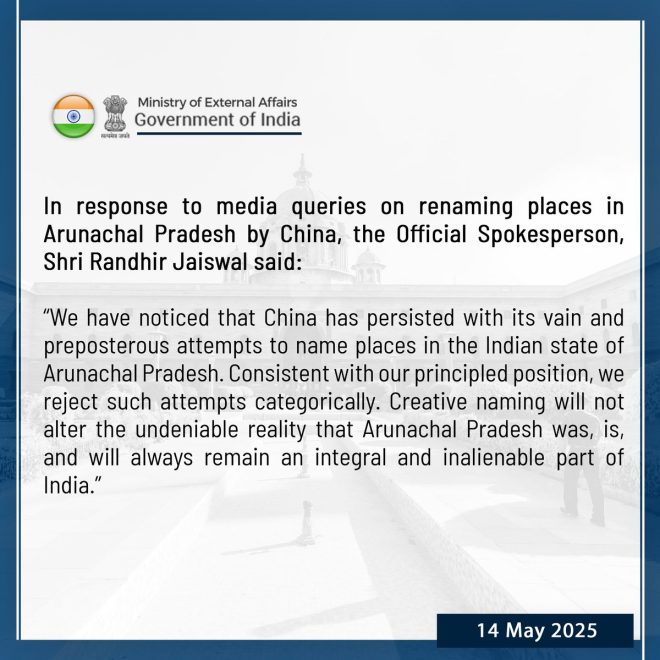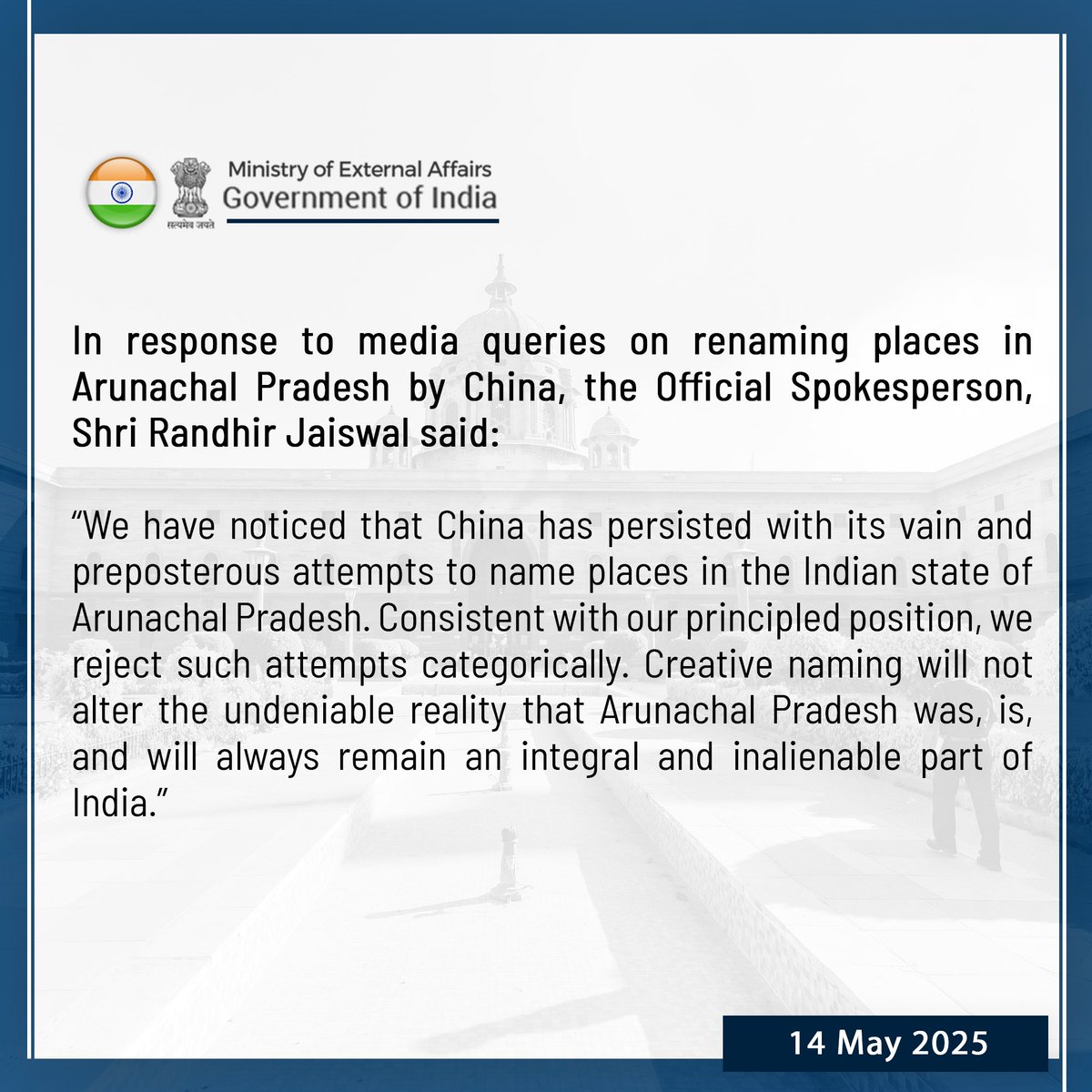
Understanding India’s Stance on China’s Renaming of Places in Arunachal Pradesh
On May 14, 2025, India’s Ministry of External Affairs, represented by Randhir Jaiswal, addressed media inquiries regarding China’s decision to rename places in Arunachal Pradesh. This event has sparked significant interest and concern, given the geopolitical sensitivities surrounding the India-China border dispute. In this summary, we will delve into the implications of this development, India’s official response, and the broader context of Sino-Indian relations.
The Context of Arunachal Pradesh
Arunachal Pradesh is a northeastern state in India, sharing a border with Tibet, which is an autonomous region of China. The region has been the subject of territorial disputes for decades, with China claiming it as part of its territory, referring to it as "South Tibet." This claim is a contentious issue, as Arunachal Pradesh is an integral part of India, both geographically and culturally.
China’s Renaming Initiative
China’s recent move to rename certain places in Arunachal Pradesh has raised eyebrows and prompted reactions from Indian officials. The renaming initiative is seen as an attempt by China to assert its claims over the territory. Historically, China has engaged in similar practices, which have been met with strong opposition from India.
India’s Official Response
In response to the media queries, Randhir Jaiswal provided a firm and clear statement, emphasizing India’s position on the matter. He reiterated that Arunachal Pradesh is an inseparable part of India and that any attempts by China to rename places within the state are illegitimate and unacceptable. Jaiswal’s comments reflect India’s resolve to maintain its territorial integrity and sovereignty.
- YOU MAY ALSO LIKE TO WATCH THIS TRENDING STORY ON YOUTUBE. Waverly Hills Hospital's Horror Story: The Most Haunted Room 502
The Importance of Diplomatic Communication
The situation underscores the importance of diplomatic communication between India and China. Both countries have a long history of border disputes, and maintaining open channels of dialogue is crucial to managing tensions. India’s response to China’s renaming initiative is not just about territorial claims; it is also about reinforcing its stance on national sovereignty.
The Broader Geopolitical Implications
The renaming of places in Arunachal Pradesh fits into a larger pattern of territorial assertions by China in the region. This behavior can have significant geopolitical implications, particularly in light of India’s strategic partnerships with other nations. India has been strengthening its ties with countries like the United States, Japan, and Australia, in part as a counterbalance to China’s growing influence in the Indo-Pacific region.
Public Sentiment in India
There is a strong sentiment among the Indian populace regarding the territorial integrity of Arunachal Pradesh. The state’s cultural and historical significance to India is profound, and any foreign claims over it are met with widespread resistance. The government’s firm stance is likely to resonate with citizens, reinforcing national unity on the issue.
The Role of Social Media
The announcement by Randhir Jaiswal was disseminated through social media platforms, highlighting the role of digital communication in contemporary diplomacy. The tweet has garnered attention and sparked discussions across various platforms, illustrating how social media can be a powerful tool for governments to convey their messages and engage with the public.
Future Considerations
As India and China navigate their complex relationship, developments like the renaming of places in Arunachal Pradesh will continue to be a focal point. Both nations must find ways to engage in constructive dialogue to mitigate tensions and avoid escalation. The international community will also be watching closely, as the dynamics between these two populous nations have far-reaching consequences for regional stability.
Conclusion
The recent media query response from India’s Ministry of External Affairs regarding China’s renaming of places in Arunachal Pradesh highlights the ongoing challenges in Sino-Indian relations. India’s firm stance on its territorial claims reflects a broader commitment to national sovereignty and integrity. As both nations move forward, the importance of diplomatic communication, public sentiment, and international partnerships will play a crucial role in shaping the future of their relationship.

Our response to media queries on renaming places in Arunachal Pradesh by China (May 14, 2025)
https://t.co/5XtzF8ImUJ pic.twitter.com/1edyuqRpog
— Randhir Jaiswal (@MEAIndia) May 14, 2025
Our Response to Media Queries on Renaming Places in Arunachal Pradesh by China (May 14, 2025)
When it comes to the ongoing tensions between India and China, one of the most contentious issues has been the naming and renaming of places in regions like Arunachal Pradesh. On May 14, 2025, the Indian Ministry of External Affairs, represented by Randhir Jaiswal, addressed media queries regarding China’s recent attempts to rename various locations in Arunachal Pradesh. This topic has sparked significant debate and concern among both nations, as it touches upon national sovereignty, cultural identity, and geopolitical strategy.
In the official statement released by the Ministry of External Affairs, Jaiswal emphasized India’s firm position regarding its territorial claims. He stated, “The names of places in Arunachal Pradesh are an integral part of our culture and identity,” underscoring that any attempts to alter these names by external forces, especially China, would not be accepted. This response was not just a knee-jerk reaction; it was a carefully crafted message aimed at reinforcing India’s stance on its territorial integrity.
Understanding the Context of Arunachal Pradesh
Arunachal Pradesh, located in the northeastern part of India, has been a focal point in India-China relations. This region is not only rich in biodiversity and natural beauty but also strategically significant due to its proximity to Tibet. The border dispute between India and China has a long and complicated history, stemming from colonial-era treaties and differing perceptions of the McMahon Line, which serves as the de facto border.
China’s recent moves to rename places in Arunachal Pradesh are seen as an attempt to assert its claims over the territory, which it refers to as “South Tibet.” This geopolitical maneuvering is not new; China has previously attempted similar actions in other disputed regions, raising alarms in neighboring countries. The Indian government has consistently rejected these claims, stressing that Arunachal Pradesh is an integral part of India.
The Implications of Renaming Places
The act of renaming places carries significant implications beyond mere semantics. It can alter the cultural landscape and reshape the identity of a region. For the people of Arunachal Pradesh, the names of their towns, rivers, and mountains hold deep historical and cultural significance. These names often reflect the rich heritage of the indigenous communities that have lived there for centuries.
When a foreign power attempts to rename these places, it can be perceived as an erasure of local history and identity. This resistance to renaming is not just about maintaining a name; it is about preserving a sense of belonging and cultural pride. As Jaiswal noted, the names of places in Arunachal Pradesh are more than labels; they are a testament to the region’s legacy and its people’s resilience.
The Broader Geopolitical Landscape
The issue of renaming places in Arunachal Pradesh cannot be viewed in isolation. It is part of a larger geopolitical struggle between India and China, which has seen rising tensions in recent years. From military skirmishes in the Ladakh region to economic competition in the Indo-Pacific, both nations are vying for influence and control.
India’s response to China’s attempts to rename places is indicative of its broader strategy to assert its sovereignty and protect its territorial integrity. By publicly addressing these media queries, the Ministry of External Affairs is sending a strong message to both domestic and international audiences that India will not back down in the face of external pressure.
Moreover, this situation has garnered attention from global powers, particularly the United States, which has expressed support for India’s territorial claims. As countries around the world take sides in this complex geopolitical landscape, the situation in Arunachal Pradesh will continue to be a point of contention.
The Role of Media in Shaping Public Perception
The media plays a crucial role in shaping public perception regarding issues like the renaming of places in Arunachal Pradesh. With the rise of social media, news outlets, and platforms like Twitter, information spreads rapidly, influencing how people understand and respond to geopolitical conflicts.
Randhir Jaiswal’s tweet regarding the ministry’s response serves as a reminder of the importance of communication in diplomacy. By engaging with media queries and providing clear, concise information, the Indian government aims to inform the public and maintain transparency regarding its stance on territorial issues.
The media’s portrayal of this situation can also impact public sentiment. A well-informed populace is crucial for a nation to rally around its government’s decisions, especially in matters of national importance. The response from the Ministry of External Affairs, therefore, is not just about addressing a specific query; it’s about fostering a sense of national unity and resilience.
Looking Ahead: The Future of Arunachal Pradesh
As the situation evolves, the future of Arunachal Pradesh remains uncertain. The Indian government’s response to China’s renaming efforts will likely set the tone for future interactions between the two nations. It is essential for India to continue advocating for its territorial claims while also engaging in constructive dialogue with China.
At the same time, the people of Arunachal Pradesh must be at the forefront of discussions regarding their identity and cultural heritage. Community leaders, local governments, and civil society organizations should work together to ensure that the voices of the indigenous populations are heard and respected in any negotiations.
Ultimately, the challenge lies in finding a balance between asserting national sovereignty and fostering peaceful relations with neighboring countries. Both India and China have a vested interest in maintaining stability in the region, given the potential economic and strategic benefits that peace can bring.
Conclusion
The situation regarding the renaming of places in Arunachal Pradesh by China is a complex issue that touches upon national identity, historical significance, and geopolitical strategy. The Indian government’s response, articulated by Randhir Jaiswal, reaffirms its commitment to protecting its territorial integrity while highlighting the cultural importance of the region’s names.
As we move forward, it is crucial to remain vigilant and engaged in discussions surrounding Arunachal Pradesh and its future. The voices of the people living in this region should guide the narrative, ensuring that their rich heritage and identity are preserved amid ongoing geopolitical tensions. The path ahead may be fraught with challenges, but a clear understanding of the stakes involved will empower India to navigate this delicate situation with confidence and resolve.
Breaking News, Cause of death, Obituary, Today
